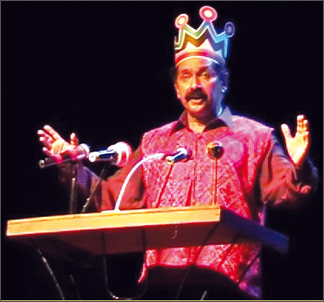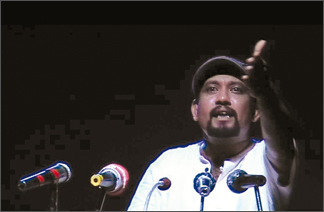'Suddek Oba Amathai' a soliloquy-feast
 Udayasiri Wickramaratne has for years entertained us with wit,
creativity, philosophy and his understanding of political economy
through his columns in the Divaina, especially Aarthika Vihilu (Economic
Jokes, written under the name 'Andarei Smith' Grandson of Adam Smith and
'Aadaraye Shabdakoshaya' (Dictionary of Love). He translated into
Sinhala for the Divaina the weekly column on economic issues penned by
the late Dr. Jayantha Kelegama (writing as 'Kanes' and later started his
own column. Udayasiri Wickramaratne has for years entertained us with wit,
creativity, philosophy and his understanding of political economy
through his columns in the Divaina, especially Aarthika Vihilu (Economic
Jokes, written under the name 'Andarei Smith' Grandson of Adam Smith and
'Aadaraye Shabdakoshaya' (Dictionary of Love). He translated into
Sinhala for the Divaina the weekly column on economic issues penned by
the late Dr. Jayantha Kelegama (writing as 'Kanes' and later started his
own column.
Both Aarthika Vihilu and Aadaraye Shabdakoshaya (e.g. 'Marriage
Registrar: the person who writes love's death certificate) provide ample
evidence of Udayasiri's talent at word-turning. The economy and sharp
observation naturally describe the poetic potential which found
expression in a collection titled 'Dawal Sihinen Dutu Kumariya' (A
princess who arrived in a daydream).
His literary CV includes two plays; 'Eelanga Javanikaavak Nethi
Naatyayak' (1991) which won many National Youth Awards for theatre that
year and 'Thunveni Lokaya' (1990) selected to the second round of the
State Drama Festival. While a student at Colombo University, Udayasiri
was a member of a street theatre group called 'Paara' which incorporated
various elements of traditional drama such as Sokari.
Endowed with a sympathetic eye for things rural but one that is not
over-weighted by awe or romanticism and therefore containing an incisive
edge, Udayasiri's reflections on 'village' life is ethnographic and
constitutes in my opinion a 'must' reading for sociology students
interested in figuring out the 'logic' of rural social processes in Sri
Lanka.
 |
|
Scenes from the play
|
'Kiri Amma' (Grandma) and 'Gamen Upan Katha' (Stories born of the
village) are more than 'sociological snippets' though. They have
literary value. Udayasiri, in short, knows how to tell a story and this
is evident in his longer narrative, 'Swarnamali Maharaja,' which is an
easy-read version of the complex issues that makes their way into the
troubled mind of Prince Dutugemunu during his period of exile. The
author weaves in to the main narrative the most telling strands in the
historical transcripts contained in folklore and gives us a fresh and
compelling version of related events and personalities.
'Swarnamali Maharaja' (that's Kavantissa, by the way) is a soliloquy
of sorts and it is easy to understand how Udayasiri came to adopt that
format in theatre. His latest play, which is in fact a collection of not
totally unrelated 'playlets', 'Suddek Oba Amathai' (A white man
addresses you), performed for the first time (deliberately) on 'All
Fools' Day, April 1, 2010, at the Lumbini Theatre, comprises 4 'talks'.
We are addressed by a white man (played by Naveen Pradeep Udawela), by
history (Jayalath Manoratne), by a woman (Madhani Malwattage) and by 'a
man who lives in fear' (Keerthi K. Ratnayake).
The format itself was 'new' to audience but not new to 'tradition',
according to Udayasiri. He claimed, in a pre-show conversation that we
are a society that is used to listening to lectures and that is why
there are many who are glued to their television sets listening to
politicians talking shop. We are used to listening to bana and to
jathaka katha. True. It worked by and large, although the script clearly
needed extensive editing to obtain a tighter and therefore more dramatic
articulation of idea.
In short, it need not have taken 2.5 hours to say all the things that
were said. All the points made (and they were excellent observations by
the way) could have been contained in a production that took not more
than an hour and a half, I felt. As it happened, elaboration and
repetition took something away from the dramatic power of Udayasiri's
penchant for economy in statement.
A sudda has a lot to say, as do 'history', a woman and a man who is
terrified. That's several libraries worth of books I would say, to give
some perspective to the challenge that Udayasiri had set himself. Still,
there was carelessness in stringing together various aspects that the
playwright had chosen to privilege.
The movement from topic to topic was jerky at times. The best
rendered of the 4 segments was history's soliloquy, and that's thanks to
both power of script as well as Jayalath Manoratne's incomparable
stage-presence.
Manoratne was so good that the others appeared weak. Not that they
were terrible, no. Soliloquys are not easy to dramatize. Even Brutus'
soliloquy on the abuse of greatness in Shakespeare's 'Julius Caesar' was
less than two dozen lines and could be got through in less than 4
minutes.
These were longer affairs and the challenge was naturally greater.
Naveen Pradeep Udawela could not bridge the rockiness of the script in
places although the ideas and the poetry embedded in the script helped
hold the attention of the audience.
Manoratne went next with 'history'. Udayasiri had thrown in enough
song and historical anecdote was laced with reference to the political
present in deft and clever ways for Manoratne to deliver. It was a great
piece of entertainment with Manoratne drawing extensively from his
considerable range of dramatic resources. Long, yes, but there was no
dip in intensity.
Keerthi K Ratnayake was both 'a man who lives in fear' and 'a man in
a hurry', it seemed. Udayasiri had deliberately written a fast-paced,
(too) short piece which had a lot of potential in content but appeared
far too repetitive.
Madhani Malwattage was constrained by the script. It was slow and the
point made were convoluted. She played her part well. Perhaps she
suffered from the fact that she made her appearance almost two hours
after the play started. There was too much soliloquy by that time,
perhaps.
Let's talk about content. The title reminded me of one of Udayasiri's
aarthika jokes, written in the early part of this decade, translated
thus: 'Some people have cats as pets, some have parrots and some others
have rabbits; but all of us and not just 'some people' have a white man
in our minds as a pet.
I expected an anti-Colonial rant. I was disappointed. Instead I got a
far more nuanced and politically far more productive and smarter
rendition of the post-colonial challenge.
The points made threw one back to Dharmapala's thesis, that the
weapons of the enemy should not be cursed, but secured and employed to
good effect. The issue of taking on coloniality includes a firm
resolution not to see things in black and white, pardon the pun. There
is always 'good' and 'bad', and Udayasiri speaks about both, in 'sudda'
and in 'kalla'.
History is a bad word. It looks too 'singular' when in fact it is
plural, as in 'histories'. Udayasiri makes some excellent points on this
aspect of the discipline/exercise. He also points out that history is
one of the least examined areas and observes that for this very reason
this is where we can find the most tasty morsels of 'news'. It is an
invitation to those who are ignorant of history and a challenge to those
who would rather not delve into the past, especially because they are
uncomfortable with the fact that they are not part of the past or are
too 'recent' to warrant the claims they tend to make.
The man who is in fear is me. It is you. I found this to be the
philosophically most satisfying of the 4 segments. The fear is not about
not being able to be honest, truthful and 'above board', but the
opposite, of telling the truth by mistake or by doing the right thing
accidentally.
This is Udayasiri having fun at our expense. He delves into that
secret place deep within us where we hide all the things we don't want
others to know about. It is the 'me' of that place that is scared, that
speaks to myself my fears about tripping and divulging that whose
revelation would make things uncomfortable. It's a reflection on the
'final frontier' of a human being. It is too heavy for soliloquy though
and was rushed through so fast that it ended up just touching surface
sensibilities and a crass reference to the everyday politics of being
rather than a serious exploration of a serious element of the human
condition.
 The weakest was the address by a woman. Udayasiri makes the point
that 'gender' is not a synonym for 'woman' and lampoons the notion of
'equality' when difference is a reality one cannot get around. It is a
light exploration of man-woman things. The weakest was the address by a woman. Udayasiri makes the point
that 'gender' is not a synonym for 'woman' and lampoons the notion of
'equality' when difference is a reality one cannot get around. It is a
light exploration of man-woman things.
He makes some sharp observations about things sexist and patriarchal,
but left me with the feeling that he was being lazy, that it was
half-done and thrown in to make up the numbers (pages, minutes or
whatever).
All four, are books that are waiting to be written. Together they
constitute a play that needs to be worked on. Given format and the
characters of playwright and player, I am sure it will be done and will
get better.
Overall, it is a fine effort and an introduction of a fresh format to
a genre that seems to have run out of new ideas. In terms of style, it
can be improved, and I am sure this will happen in subsequent
productions.
In terms of content, Udayasiri is only giving us the tip of the
iceberg. It is too tempting not to explore. Speaking strictly for
myself, as a freelance writer, Udayasiri has given me a wealth of
material.
That 2.5 hours at the Lumbini was time very well spent.
Malinda Seneviratne is a freelance writer who can be reached at
[email protected]
|

